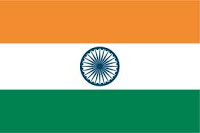Bangalore, INDIA – As I write this, I look around my room, and realize how incredibly fortunate I am. Typing on my laptop, with my iPod and cell phone next to me, surrounded by a shelves replete with books, I understand how much I take everything I have for granted.
Not even half a kilometer from me and my luxurious lifestyle is a village full of the destitute, hungry, perhaps illiterate people, all struggling to make ends meet and get their two meals a day.
While I attend a prestigious school filled with well-trained staff, state-of-the art facilities and a prodigious library, just down the road are numerous underprivileged schools lacking basic books, furniture, and even space. Classrooms the size of my bedroom cram 60 children.
At night, when I curl up in my plush bed and warm comforters, so many families huddle in their huts, vulnerable to the intense cold and rain outside. Yes, India has prospered a great deal economically, yet in so many aspects, it remains underdeveloped. Over 320 million people live below the poverty line, and more than 400 million are illiterate.
Growing up in the United States, I was exposed to the wonderful world of books by visiting some of the numerous public libraries in my city. Visiting the library is a common practice for anyone living there, regardless of his or her financial stability. Yet after moving to India a few years ago, I realized the lack of such facilities in Whitefield, Bangalore.
Of course, it was never a problem for me, as I could easily access my school library or go to one of Bangalore’s many bookstores. But one day it dawned on me that I was a minority in my city.
Tens of thousands of poor children, for whom mere education itself is considered monumental, don’t have access to books beyond their school textbooks. They miss out on the sensational experience of being able to travel across the world, through time, into fantasy, and into mysteries through literature, and don’t have the opportunity to enhance their reading skills and vocabulary.
I understood that a large amount of the education process comes from reading books, which these children lacked. There was definitely something that I could do to help.
A year ago, I conceived the idea of setting up a traveling library that rotates among underprivileged schools in Bangalore. I took this idea to my school principal, who gave me constructive criticism.
After developing a more concrete plan over the summer, in August 2008, a group of us 11th graders founded Operation Education.
In order to establish the library, we held book drives and accumulated well over 2,500 books.
Once we had the books, the arduous task of sorting, labeling, stamping, and recording began. Countless numbers of 11th grade students in my school helped in this process.
So far, we have placed books in five underprivileged schools, and have several more in mind.
It’s been a challenging process, but an incredibly worthwhile one. Seeing the bright-eyed faces of eager children thirsting for knowledge and interacting with them is truly gratifying.
As individuals, all of us volunteering with Operation Education have developed our capability to overcome hurdles, and have enhanced our overall synergy and ability to work together as a team towards a common goal, spreading the gift of knowledge.
Some people say that these children may not even have enough to eat, and given the chance to go to school itself is a big issue, so how will these poverty-stricken children benefit from books?
More educated, well-read children with broader perspectives are the key to a brighter future.
Education is undeniably the pathway to success, the way out of poverty, and the solution to so many of the world’s problems.
Even when everything else in life is taken away, education is a tool that will never fade.
Janani Ramachandran is a Junior Reporter for Youth Journalism International.



